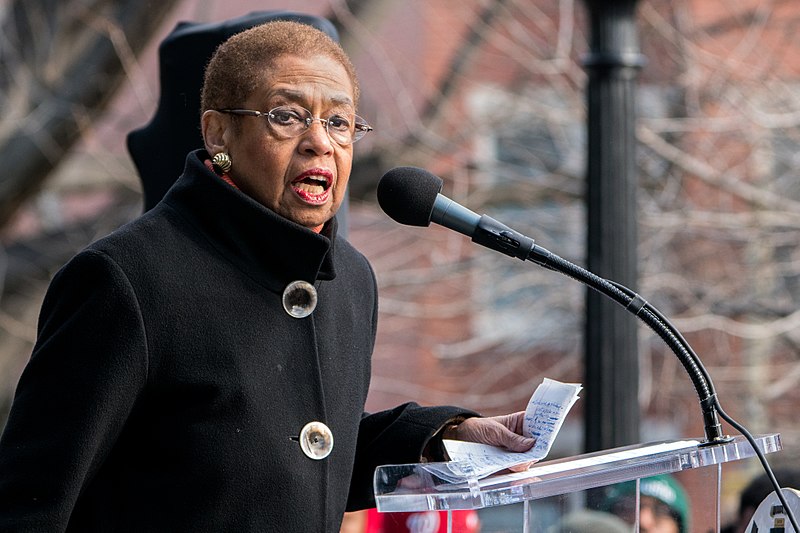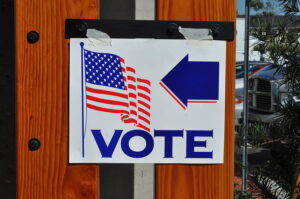For the first time in history, D.C. statehood has been approved by a house of Congress, passing the House in a 232-180 vote on June 26.
Despite the vote, and increasing support in the Senate, the question of statehood remains unanswered, and likely will until at least after the general election in November.
The vote marked the first time in over 50 years that a house of Congress approved the creation of a new state—Hawaii achieved statehood in 1959. Appropriately designated H.R. 51, the bill would shrink the federal area of the District of Columbia to only encompass areas near the White House and Capitol Hill while creating a new state out of the remainder of D.C., renamed “Douglass Commonwealth.” The state would have one representative, based on its population size, and two senators, like every other state. D.C. currently has one non-voting representative in the House and no representation in the Senate.
Achieving statehood would not only ensure that D.C. residents have federal representation in Congress but also allow the city’s voters to directly affect local policy. The federal government’s ability to place limits on D.C. budgets has historically reduced the district’s autonomy in setting its own policies, including efforts to fight the HIV crisis and provide funding for reproductive healthcare. Each of these issues disproportionately affected Black residents, who make up 46 percent of D.C., as well as low-income communities.
The passage of H.R. 51 was virtually assured going into the House vote as the bill had 227 co-sponsors, constituting a majority of the members of the House of Representatives and including all of the Democratic leadership. All but one Democrat—moderate Congressman Collin Peterson (D-MN)—voted in favor.
While D.C.’s population has formally fought for statehood since the 1970s, H.R. 51 is the closest the city has ever gotten to achieving it. With 700,000 residents, D.C.’s population is greater than both Wyoming and Vermont and its citizens pay a higher per-capita federal income tax than all other states.
Statehood is popular among D.C. voters as well. In 2016, 86 percent of DC residents voted for a proposal to advocate for D.C. statehood, in a referendum with 65 percent turnout. Changes in the size of the federal district are not unprecedented—in 1846, most of modern-day Arlington was ceded from D.C. back to the state of Virginia.
Amidst growing public support for D.C. statehood, the June vote marked a significant shift in the position of the Democratic Party. The last time the House voted on statehood was in 1993, where it failed 153-277 despite Democratic control of the chamber. In that vote, 40 percent of House Democrats opposed the bill, including current House Majority Leader Steny Hoyer (D-MY), who reversed his opposition to D.C. statehood in 2019.
In the aftermath of the House vote, Senate Democrats have increased their advocacy for D.C. statehood. Rhode Island Senators Jack Reed (D-RI) and Sheldon Whitehouse (D-RI) both signed on to co-sponsor the Senate version of the bill for D.C. statehood on July 2—previously, they were the only two Democrats from a state Hillary Clinton won in 2016 who opposed the bill.
Including Reed and Whitehouse, seven Democratic senators have newly co-sponsored the bill since June, creating a total of 43 senators in support of statehood. There are currently four senators who caucus with Democrats, meaning they coordinate and often vote with the party, who have not yet supported the bill—Doug Jones (D-AL), Angus King (I-ME), Kirsten Sinema (D-AZ), and Joe Manchin (D-WV).
Rising support for D.C. statehood has also resulted in a split between D.C. Democrats and senators who do not support statehood. On July 9, the D.C. Democratic Party announced in a press release titled “No Donation Without Representation” that they would not campaign for or donate to any candidates who do not support statehood. Of the four Democratic senators who currently do not support statehood, only Doug Jones is facing re-election in November.
Despite the recent surge in support by Senate Democrats, the Republican majority in the Senate means H.R. 51 can be easily blocked from moving forward. Senate Majority Leader Mitch McConnell (R-KY) previously likened DC statehood to “full-bore socialism,” and is unlikely to allow a vote on it. That said, some Republican senators have pushed for a vote in order to likely defeat the measure and force all senators to publicly declare a position.
Further complicating Democratic plans to grant D.C. statehood is the filibuster, essentially requiring the support of 60 senators to pass major legislation. While a Democratic-controlled Senate would be able to abolish the filibuster with only a simple majority, it would require at least 50 votes, and many senators from both parties have historically opposed filibuster reform—in 2017, 61 senators signed a letter opposing the idea of abolishing the practice.
As Democratic chances for winning back the Senate increase, the party is considering what it will do if given the chance to do away with the filibuster. While presumed Democratic Presidential Nominee Joe Biden has historically been opposed to removing the filibuster, he recently signaled openness to remove it should it become impossible to pass legislation otherwise. Additionally, Senator Chris Coons (D-DE), a leading co-author of the pro-filibuster 2017 letter, recently stated that he could be open to changing his mind.
While McConnell has not commented on D.C. statehood since 2019, some individual Republican lawmakers have outlined their own justifications for opposing the bill. Speaking at the Idaho Republican Convention on the day of the House vote, Senator Jim Risch (R-ID) claimed that were D.C. and Puerto Rico to be admitted as states, Republicans would be unable to compete for control of the Senate. Risch’s claim was incorrect, however—if D.C. and Puerto Rico were both admitted as new states and each elected two Democratic senators to the current Senate, Republicans would still hold the majority.
Republican opposition to the bill does not appear to be unanimous. Senator Lisa Murkowski (R-AK) indicated that she was sympathetic to the movement, given her own experience in being born in Alaska before it became a state in 1959. “Whether we’re talking about D.C. or Puerto Rico, as long as it’s driven by the residents I’d pay attention,” Murkowski said.
The Senate debate has also sparked controversy over implied racism in the arguments against statehood. Were it to be admitted, D.C. would be the only plurality-Black state in the country. In a June speech, Senator Tom Cotton (R-AR) discounted the historically Black residents of the city and claimed that Wyoming, a state with a lower population than D.C., was a “well-rounded working-class state” and that “a new state of Washington would not be.”
In his speech, Cotton also attacked D.C. Mayor Muriel Bowser, saying he did not “trust Mayor Bowser to keep Washington safe if she were given the powers of a governor.” As a mayor, Bowser has more limited powers than a governor, especially in regard to her inability to deploy the D.C. National Guard. Were D.C. to be admitted as a state, Bowser would become the first Black female governor in U.S. history.
Less than a week after Cotton’s speech, which received hearty criticism, Senator Steve Daines (R-MT) created similar controversy when he told pro-statehood lawmakers to “go out to where the real people are at across the country and ask them where they think.” Additionally, both Daines and Senator Lindsey Graham (R-SC) stated that they opposed D.C. statehood because the additional representatives would “dilute Montana’s voice and South Carolina’s voice in the U.S. Senate”
The suggestion that D.C. residents were not “real people” drew swift backlash from Senate Minority Leader Chuck Schumer (D-NY). Referring to the Republican senators, Schumer asked, “Why don’t you take a walk in some D.C. neighborhoods and ask some of these families if they consider themselves ‘real people?’” Schumer also called Daines’ statement “dehumanizing, disgraceful, and obscene.”
Even prior to recent controversies, the significance of D.C. statehood for Black Americans was not lost on House Democrats at the time of the original June vote. In a statement urging her colleagues to support H.R. 51, non-voting D.C. Congresswoman Eleanor Holmes Norton (D-D.C.) continued to tie D.C. statehood to historical injustices faced by Black Americans, including her own family.
“My great-grandfather Richard Holmes, who escaped as a slave from a Virginia plantation, made it as far as D.C., a walk to freedom but not to equal citizenship,” she said. “For three generations my family has been denied the rights other Americans take for granted.”








No to DC statehood
[…] one non-voting member in Congress – a population bigger than Vermont. In June of 2020, the House approved the idea of DC statehood 232-180 vote on June 26 – shrinking the area of DC to […]
[…] forever. The House bill was dead on arrival in the Republican-controlled Senate, but that will change if the Democrats gain control. And if D.C. gets statehood, there will likely be a renewed push to […]
[…] forever. The House bill was dead on arrival in the Republican-controlled Senate, but that will change if the Democrats gain control. And if D.C. gets statehood, there will likely be a renewed push […]
[…] forever. The House bill was dead on arrival in the Republican-controlled Senate, but that will change if the Democrats gain control. And if D.C. gets statehood, there will likely be a renewed push to […]
[…] forever. The House bill was dead on arrival in the Republican-controlled Senate, but that will change if the Democrats gain control. And if D.C. gets statehood, there will likely be a renewed push to […]
[…] forever. The House bill was dead on arrival in the Republican-controlled Senate, but that will change if the Democrats gain control. And if D.C. gets statehood, there will likely be a renewed push to […]
[…] forever. The House bill was dead on arrival in the Republican-controlled Senate, but that will change if the Democrats gain control. And if D.C. gets statehood, there will likely be a renewed push […]
[…] forever. The House bill was dead on arrival in the Republican-controlled Senate, but that will change if the Democrats gain control. And if D.C. gets statehood, there will likely be a renewed push […]
[…] forever. The House bill was dead on arrival in the Republican-controlled Senate, but that will change if the Democrats gain control. And if D.C. gets statehood, there will likely be a renewed push to […]
[…] forever. The House bill was dead on arrival in the Republican-controlled Senate, but that will change if the Democrats gain control. And if D.C. gets statehood, there will likely be a renewed push […]
[…] forever. The House bill was dead on arrival in the Republican-controlled Senate, but that will change if the Democrats gain control. And if D.C. gets statehood, there will likely be a renewed push to […]
[…] unclear whether another major structural change envisioned by Democrats, which Manchin and others are skeptical about, would stand a better chance: statehood for Washington, […]
[…] unclear whether or not one other main structural change envisioned by Democrats, which Manchin and others are skeptical about, would stand a greater likelihood: statehood for Washington, […]
[…] unclear whether or not one other main structural change envisioned by Democrats, which Manchin and others are skeptical about, would stand a greater likelihood: statehood for Washington, […]
[…] unclear whether or not one other main structural change envisioned by Democrats, which Manchin and others are skeptical about, would stand a greater probability: statehood for Washington, […]
[…] unclear whether another major structural change envisioned by Democrats, which Manchin and others are skeptical about, would stand a better chance: statehood for Washington, […]
[…] unclear whether another major structural change envisioned by Democrats, which Manchin and others are skeptical about, would stand a better chance: statehood for Washington, […]
[…] unclear whether another major structural change envisioned by Democrats, which Manchin and others are skeptical about, would stand a better chance: statehood for Washington, […]
[…] unclear whether or not one other main structural change envisioned by Democrats, which Manchin and others are skeptical about, would stand a greater likelihood: statehood for Washington, […]
[…] unclear whether another major structural change envisioned by Democrats, which Manchin and others are skeptical about, would stand a better chance: statehood for Washington, […]
[…] ne sait pas si un autre changement structurel majeur envisagé par les démocrates, qui Mandchin et autres sont sceptiques, auraient de meilleures chances de devenir un État pour Washington, […]
[…] unclear whether another major structural change envisioned by Democrats, which Manchin and others are skeptical about, would stand a better chance: statehood for Washington, […]
[…] unclear whether or not one other main structural change envisioned by Democrats, which Manchin and others are skeptical about, would stand a greater probability: statehood for Washington, […]
[…] unclear whether another major structural change envisioned by Democrats, which Manchin and others are skeptical about, would stand a better chance: statehood for Washington, […]
[…] unclear whether another major structural change envisioned by Democrats, which Manchin and others are skeptical about, would stand a better chance: statehood for Washington, […]
[…] unclear whether another major structural change envisioned by Democrats, which Manchin and others are skeptical about, would stand a better chance: statehood for Washington, […]
[…] unklar, ob ein weiterer großer Strukturwandel von den Demokraten ins Auge gefasst wird Manchin und Andere sind skeptisch, hätte eine bessere Chance: Staatlichkeit für Washington, […]
[…] unclear whether another major structural change envisioned by Democrats, which Manchin and others are skeptical about, would stand a better chance: statehood for Washington, […]
[…] unclear whether another major structural change envisioned by Democrats, which Manchin and others are skeptical about, would stand a better chance: statehood for Washington, […]
[…] unclear whether another major structural change envisioned by Democrats, which Manchin and others are skeptical about, would stand a better chance: statehood for Washington, […]
[…] unclear whether another major structural change envisioned by Democrats, which Manchin and others are skeptical about, would stand a better chance: statehood for Washington, […]
[…] unclear whether another major structural change envisioned by Democrats, which Manchin and others are skeptical about, would stand a better chance: statehood for Washington, […]
[…] unclear whether another major structural change envisioned by Democrats, which Manchin and others are skeptical about, would stand a better chance: statehood for Washington, […]
[…] unclear whether or not one other main structural change envisioned by Democrats, which Manchin and others are skeptical about, would stand a greater probability: statehood for Washington, […]
[…] unclear whether or not one other main structural change envisioned by Democrats, which Manchin and others are skeptical about, would stand a greater likelihood: statehood for Washington, […]
[…] unclear whether another major structural change envisioned by Democrats, which Manchin and others are skeptical about, would stand a better chance: statehood for Washington, […]
[…] unclear whether another major structural change envisioned by Democrats, which Manchin and others are skeptical about, would stand a better chance: statehood for Washington, […]
[…] if the upcoming significant structural change envisaged by the Democrats is that Manchin and others they’re skeptical, they would have a better chance: statehood for […]
[…] unclear whether or not one other main structural change envisioned by Democrats, which Manchin and others are skeptical about, would stand a greater probability: statehood for Washington, […]
[…] unclear whether another major structural change envisioned by Democrats, which Manchin and others are skeptical about, would stand a better chance: statehood for Washington, […]
[…] unclear whether another major structural change envisioned by Democrats, which Manchin and others are skeptical about, would stand a better chance: statehood for Washington, […]
[…] unclear whether another major structural change envisioned by Democrats, which Manchin and others are skeptical about, would stand a better chance: statehood for Washington, […]
[…] unclear whether another major structural change envisioned by Democrats, which Manchin and others are skeptical about, would stand a better chance: statehood for Washington, […]
[…] unclear whether another major structural change envisioned by Democrats, which Manchin and others are skeptical about, would stand a better chance: statehood for Washington, […]
[…] unclear whether or not one other main structural change envisioned by Democrats, which Manchin and others are skeptical about, would stand a greater probability: statehood for Washington, […]
[…] unclear whether another major structural change envisioned by Democrats, which Manchin and others are skeptical about, would stand a better chance: statehood for Washington, […]
[…] unclear whether another major structural change envisioned by Democrats, which Manchin and others are skeptical about, would stand a better chance: statehood for Washington, […]